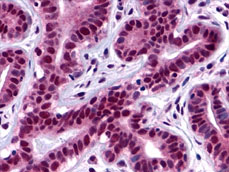-
US | en
- Contact and Support
- Resources
- Antibody Webinars
- Webinar: Mastering IHC Staining Experiments
-
Contact and Support
-
Resources
-
Antibody Webinars
- Webinar: Overcome Assay Challenges using Custom Recombinant Antibodies
- Webinar: Recombinant Antibodies as Positive Controls and Calibrators
- Webinar: Measuring Adaptive and Innate Immune Responses in Ruminants
- Webinar: Mastering IHC Staining Experiments
- Webinar: Generation of High-affinity Recombinant Antibodies for Application in Immuno-MRM
- Webinar: Optimize your Assays using Recombinant Antibodies Selected for Desired Affinity
- Webinar: Porcine CD4+ T lymphocytes and their Antigen-Specific Immune Response
- Webinar: Optimize your Flow Cytometry
- Webinar: A Question of Life or Death” - Differentiating Between Healthy and Apoptotic Cells
- Webinar: CSF1, CSF1R and Control of Macrophage Differentiation
- Webinar: “Complex or not?” Immunoprecipitation (IP) application
- Webinar: Take control of your flow cytometry
- Webinar: The making of recombinant anti-idiotypic antibodies for high performance in bioanalytical assays
- Webinar: Fluorescence and compensation in flow cytometry
- Webinar: Multicolor panel building in flow cytometry
- Webinar: Apoptosis in flow cytometry
-
Antibody Webinars
-
Resources

Webinar
Mastering IHC staining experiments
In an Immunohistochemistry (IHC) experiment, a primary antibody binds specifically to a protein of interest present in a tissue. The antibody binding is then visualized by a detection system, which provides information about if and where the protein is present in the tissue. IHC is a common method in life sciences to determine morphological abnormalities and the presence of markers indicative of certain diseases, such as cancer.

Staining of formalin fixed, paraffin embedded human ductal and lobular epithelium with rabbit anti-Focal Adhesion Kinase (AHP1106).
The "Mastering Immunohistochemistry staining experiments" webinar gives you a basic overview of the different IHC protocol steps (with a focus on sample preparation, reagent selection, antigen retrieval and antibody staining). We discuss the most common pitfalls and provide hands-on tips on how to troubleshoot this complex type of experiment. We recommend this webinar to IHC novices and researchers with limited experience of this technique.
Topics include:
- IHC procedure overview
- Most common IHC pitfalls
- Tips and tricks and troubleshooting advice
-
IHC protocol steps (with a focus on sample preparation, reagent selection, antigen
retrieval and antibody staining)
Webinar: Mastering IHC experiments
Presented by: Dr Judith Langenick (Product Manager at Bio-Rad)
Speaker Biography: Dr Judith Langenick (Product Manager at Bio-Rad)
Judith graduated from the University of Dundee (Scotland) with a B.Sc. in Molecular Biology and a Ph.D. Her thesis research, in the group of Prof. Jeffrey Williams, focused on elucidating STAT signaling pathways in the social amoeba Dictyostelium discoideum. For her postdoctoral research, Judith moved to Dr. Ketan J. Patel’s group at the MRC Laboratory of Molecular Biology in Cambridge, where she was investigating the role of the Fanconi Anemia DNA Repair Pathway. Since leaving academic research Judith has held product management positions in both Germany and the United Kingdom during which she was involved in the development and global launch of novel antibody portfolios.
For more information about Immunohistochemistry, please refer to our IHC resources: